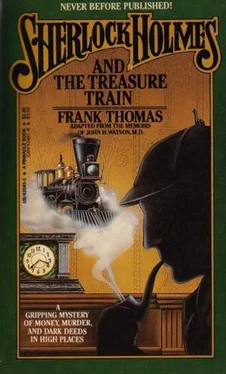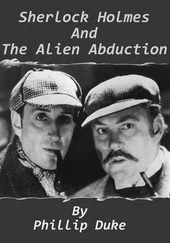"That did slow up the pursuit," said Frisbee. "As soon as the robbery was made known to the engine driver and fireman, the locomotive went into reverse and there were signals all up and down the line. By the time they reached the station between the scene of the robbery and London, it was obvious that the missing boxcar had not come that way. Then someone recalled the old spur line, and the local constables, augmented by railway police, hurried back to it. By that time the wagon and the hijackers were long gone. Neighboring villages were alerted but nothing came of it."
Holmes had taken his cherrywood from the mantle and stuffed it with shag. Now he ignited it and puffed furiously. "Anyone," he said finally, "who could plan a theft so meticulously would not leave the disposition of the loot to chance."
He resumed his seat in the cane-back, gazing into the embers of the hearth fire. "See how they chose the place to strike. An upgrade, which would slow down the engine, but more important, bring the law of gravity into play. The rate of acceleration of the stolen boxcar had to be judged carefully. Too fast and it would derail itself. Too slow and it might not gain the momentum to carry it to the spur line and beyond. You did indicate that the railway car was found some distance from the main line, did you not?" he asked of Frisbee.
The banker nodded.
Holmes laid aside his pipe, and I sensed that he would embark on one of the recapitulations that he found so helpful. I was right. "Two men at least reached the roof of the first boxcar. You mentioned smoke bombs, so I assume they were thrust through the rifle slots of the mobile blockhouse simultaneously and from both sides."
Again Frisbee agreed.
"With the riflemen temporarily out of action, they made their way to the rear of the boxcar and lowered themselves to disengage their prize from the rest of the train. Having uncoupled the connection, no difficult feat, they were now rolling downgrade with the freed bullion carrier. What would have been their next move?"
Frisbee had a ready answer. "An iron ladder would allow them to gain the roof. It seems likely that they used it to arrive above the sliding door to the boxcar. One must have lowered the other down the side of the moving car to attack the door's fastening."
"By what means?" queried the sleuth.
"Cold chisel."
"Which requires a hammer. Which indicates two free hands, so the man was lowered by rope."
"I would think so," stated Frisbee. "By the time the boxcar had rolled off the main line, the job was probably complete and they were ready to unload."
"Aided by the third man," said Holmes.
"Where did he come from?" I asked.
Holmes patiently explained. "As soon as the treasure train passed the spur line, someone had to be there to activate the switch so the boxcar would leave the main line on its return trip. Then the third man closed the switch and took after the boxcar, on foot, I would imagine. By the time the boxcar came to a stop, the third man was available to aid in the unloading. One does not move a half million in gold in but a moment."
"Might there not have been more robbers involved?" I asked. It seemed a reasonable question.
"Not it I were planning it," said Holmes. "The more tongues, the more talk."
Again I blessed providence that my friend had not been born with a larcenous twist in his great brain. Had this been so, surely he would have made the infamous exploits of the late Professor Moriarty seem like something out of Alice in Wonderland.
Frisbee was eyeing my friend shrewdly. "Inspector Stanley Hopkins was rushed to the scene from the Yard."
Holmes smiled. "Our friend Lestrade will be much put out I'm sure."
Frisbee continued: "Hopkins followed your line of thought regarding a member of the gang being positioned close to the spur line. He investigated that section closely but found no marks of a bicycle or horse."
"Then we can assume one of the thieves was fleet of foot." The detective's next question surprised me. "What was the original purpose of the spur line?"
"To service a tin mine that petered out a number of years ago."
"The boxcar came to a stop near the end of track?"
"Quite close to it." Frisbee let a silence grow, and then his eyes narrowed as he posed the key question. "What do you think?"
"I can give you a one-sentence summation," replied Holmes. "It is a pity that the security methods of the Birmingham and Northern were not planned as carefully as the robbery."
"Had they been, I would not be here," stated the banker laconically.
Holmes shook his head. "I fear your visit, as welcome as it is, has been for naught."
"We must talk of that."
"To no avail," said Holmes, and there was a note of finality in his voice. "You stated that you had heard of our encounter"—his eyes flashed to me for a brief moment—"with Alvidon Daniel Chasseur of the B & N. As a result of it, I vowed to have nothing to do with his stolen bullion."
"It's not really his problem," stated Frisbee. "Or his bullion either. Chasseur took on this gold transfer with an eye to future business. Shipments of special cargo. That's a nautical expression, but it has come to have meaning with land transportation as well. If the thing had worked smoothly, his armored-train idea might have caught on in other fields. However, that much gold in one place incurred a risk, so he took a policy on the shipment with our Inter-Ocean insurance division. If the gold isn't recovered, we stand to lose half a million pounds, the face value of our short-term coverage."
Holmes' manner had changed with Frisbee's words, but he stood by his guns, albeit in a less dogmatic manner.
"An investigation would involve my coming in contact with that man again . . ."
"Holmes, if we have to remit the insurance money, Chasseur's only problem is loss of face for having the bullion spirited out from under him. This matter has all the elements that I know you love so well. Take that Herefordshire banker Trelawney, for instance."
"Ezariah Trelawney?" exclaimed Holmes with a lightning glance in my direction. "What has he to do with it?"
"Trelawney arranged the consortium of west coast banks that provided the gold in the first place. Murdered, you know."
"We certainly do," I said forcefully.
Frisbee registered surprise at my vehemence but shrewdly sensed that the wind had shifted and held his silence.
Holmes had risen again and unconsciously retrieved his cherrywood. Chewing on its stem, he stared into space for a moment before returning his intense gaze to Frisbee. "Sometimes fate steps in," he stated. "All right, I'll take on the bullion case on behalf of Inter-Ocean Trust."
Chapter 5
The Armored Train
ONCE MY FRIEND had committed himself, Claymore Frisbee hastened proceedings by the simple method of saying yes to everything. He seemed plagued by the fear that the great sleuth might change his mind. I could have reassured him on that point, for when Holmes decided on a course of action, he stuck to it with the tenacity of the English bulldog. The banker agreed to arrange an appointment with Richard Ledger, the B & N head of security, and while Holmes was gazing out the bow window considering other necessary lines of investigation, Frisbee handed me an unmarked envelope that had to be a pre-prepared persuasion ploy.
I could guess what it contained. Holmes' habitual reserve was most apparent in his reluctance to consider or discuss money, an enduring neurosis of the English upper middle class. Frisbee, who knew his man, had written a generous check for expenses to nail down the detective's involvement in the bullion problem. Regardless of his motive, I mentally thanked the banker, for this case gave indications of a widespread search and Holmes was sure to involve what his brother, Mycroft, referred to as the "ragtag army" at his command. When deputizing the shadowland group he used, Holmes seemingly gave no thought to expenditures. However, his methods were not as Croesus like as might seem at first sight. The most precious commodity in the sleuth's opinion was time. "Who can place a price, Watson, on an hour?" he was wont to ask on occasion, and I must admit that my native frugality could find no response to this.
Читать дальше












